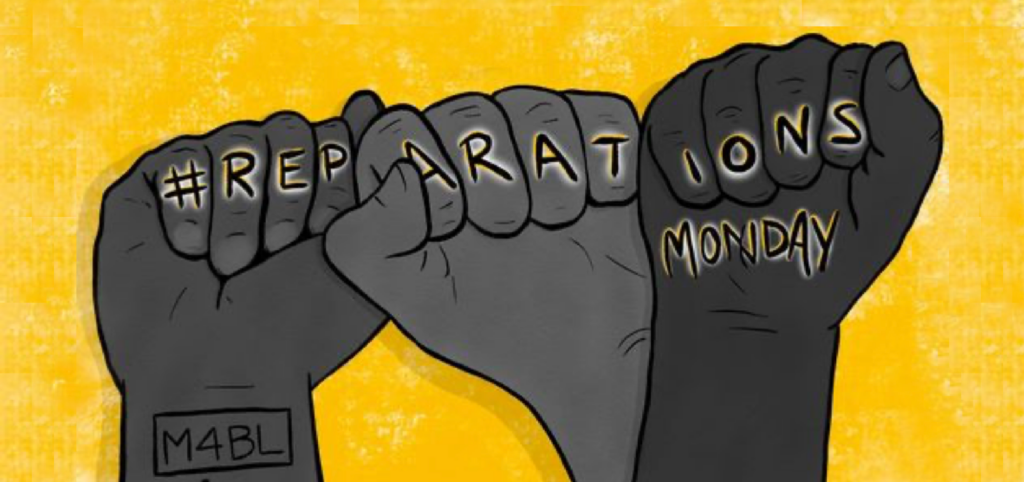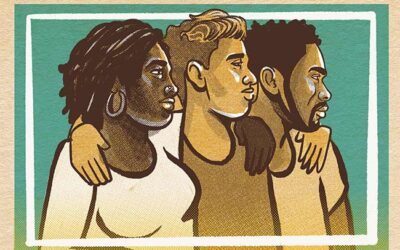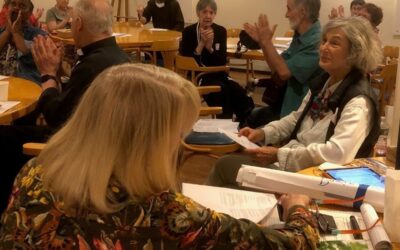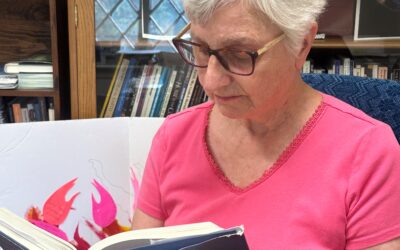
By William F. Hurley, Associate
It has been almost four years since I began to participate on the Anti-Racism and Voting Rights Committee formed by the Sisters of Charity of New York. Our vision is to look at white supremacy, hidden or blatant racism, and minority voter discrimination in America. We also offer suggestions to the leadership of the congregation regarding these issues. While this committee helped me personally examine my own racism, it has also allowed me to witness the openness of sisters and associates to explore their own racism and to reach back in the congregation’s history for signs of racism since the days of St. Elizabeth Ann Seton in the early 1800’s.
In 2022, the congregation sponsored a day of discussion on the topic of “facing our racism.” Like me, many sisters and associates faced their own sense of racism because of what they learned that day. We all began to realize that our work with the poor was often a one-way street. We were the teachers; the poor, mostly Black Americans, were the students. Our eyes were opened, and we realized we were learning so much from others. We recommended to leadership that they invite Shannen Dee Williams to speak but outreach to her told us she was booked well into the future. She was also about to publish a book which would not be looking favorably on St. Elizabeth Ann Seton regarding slavery.
Through our committee we work for systemic change regarding racism. One example is the on-going monthly sessions in which we are reading “The 1619 Project”, compiled by Nikole Hannah-Jones. Another would be our strong advocacy efforts in partnership with NETWOK Lobby. It is through this effort that we are seeing fair and just laws being passed to increase the ability of Black people to vote freely. It is also through this effort that we have witnessed the many unjust laws presented throughout America to continue the hardships placed upon minority people who seek to vote.
One topic we have discussed and continue to do so is reparations to the Black community. When reparations are mentioned most people immediately think of money. I find it difficult to place a monetary value on the impact slavery has had on individual descendants of America’s greatest wrong. Yes, America did reparations for the unjust treatment of Japanese Americans because of how we treated them during World War II. But we could identify the individual people we hurt and the degree to which they suffered. America tried and failed miserably as we sought to pay reparations to Native Americans for the land, we took from them. Tribes and organizations received millions of dollars, but individual Native Americans received little compensation and continued to live in poverty. Reparations were successful in a case in Florida when Black residents saw their entire town burned down by a murderous white mob. Each family was identified, and a specific amount of money provided for their life and property losses.
Unlike most white Americans I do believe a form of reparation must be done. This is where systemic change can come into play. One lesson I have learned through examining my own racism is that it must be a group of Black and Brown individuals who look at reparation efforts and say yea or nay. I myself want to see a change in school funding in New York State. For a start, I would like the property taxes paid by each county throughout the state pooled and a formula developed allowing each student in the county to receive the same allocation. This will allow a poor school district the same funds to educate its children, as a wealthy district. I see it as a step, but I have not proposed it to parents whose children will benefit. It is a form of reparation, but it does not give each person who declares themselves a descendant of a slave a dollar amount. If someone can tell me how monetary dollars can fairly be used for repartitions, I am open to suggestions.
Georgetown University has adopted a plan to pay reparations for its ownership of slaves who were then sold for funds needed to keep the university open. The reparations will be in the form of health clinics in Black communities, educational grants to the Historically Black University System and funds provided to descendants of the 272 slaves sold, many of whom they can identify.
The Sisters of Charity Federation has researched and discovered that prior to 1865, the Sisters of Charity of St. Joseph and the Daughters of Charity of St. Vincent de Paul benefited from the labor of enslaved people in Emmitsburg, Maryland; New Orleans, Louisiana; and St. Louis, Missouri. While there is no evidence that St. Elizabeth Ann Seton, actually owned a slave, it is confirmed that her grandfather bequeathed her a then 3-year-old, “negro boy formerly named Brennus”, in his will. There is no further evidence of this enslaved man’s fate.
In 1819, less than two years before Mother Seton’s death, financial records indicate that one of the schools she founded in Maryland accepted payment for tuition from proceeds from the sale of an enslaved person.
The Sisters of Charity Federation, as a first expression of their sorrow for those enslaved, are erecting a monument on the grounds of The Elizabeth Seton Shrine in Emmitsburg, Maryland. In lieu of, or in addition to, this initiative, I suggest that a selection of one hundred prominent Black cemeteries be developed, and a plaque established at each location. I see the original idea as apologizing to the apologizers. In addition to this reparation, the Federation congregations are now exploring additional actions that will contribute to the work that must be done to bring about meaningful change.
We must remember that slavery was in the American culture for generations. I do not believe slave holders were sinning. However, once such ownership became outlawed and the immoral use of slaves continued, the sin could be “activated.
Knowing today the presence of great discrimination against Black people both in the past and today, I would suggest that Catholics throughout the United States come together and explore how we can help to move the canonization of “America’s Saintly Six” Black candidates forward as a group. Continuing the efforts of the Office of Peace, Justice and Integrity of Creation is another means to help bring justice to our very racially prejudiced country. Funding a staff member in the PJIC Office to bring about systemic change regarding this issue would be a powerful message. Another suggestion involves the Federation coming together in future endeavors to assure that racism and discrimination against minorities is an important part of their work.
Finally, I ask all, not just “The Charities” or the American Catholics recognize their responsibilities but that we all do so timely and publicly.




0 Comments